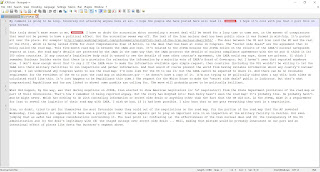Between the World and Me
by Ta-Nehisi Coates
published July 14th 2015 by Spiegel & Grau
ISBN13 9780147520500
(Buy the book; support the reviewer.)
Many critics and some fans of Ta-Nehisi Coates say his literary and attitudinal offense is that his work lacks optimism and that his message embraces despair. This book delivers bleak tales that take place within an abysmal system, no doubt; but not once was there allusion to a doomed future or a call to succumb to a hopeless present. There exists a picture of helplessness, yes, a desperate and disabusing helplessness that, for example, brings parents to fiercely protect their children, but we hear nothing of the defeatism that reviewers and interviewers primed me to expect.
I wonder if some readers balk at investigating the relationship between thorough acknowledgement of an atrocious situation and personal acknowledgement of responsibility for it... in the same way that an employee in a staff meeting resists analyzing what went wrong the project, in the same way that people who benefit or believe they benefit from the longstanding formulas of racism cannot recognize the difference between an unfortunate event and a continual tragedy that they take part in. When first entertaining ideas that upend our conceptions, we often tend toward consolation or, in context of this book, the Dream. Coates explicitly puts it to his reader to ditch dreams, innocence, and rationalizations in favor of concise truth-- a journey and a destination he, in one through-line, likens to his experiences since youth of learning the craft of poetry, which necessitated questioning and confronting one's thoughts so as to jettison any excess. To encourage his reader along, the author divulges myths that he himself passionately developed in the course of building a heartening identity for a person born on the underside of oppression.
What I heard this book declare is that the future requires a struggle to see things as they truly are so that we-- in a wishful belief that appalling institutions are bound to somehow naturally improve, that special individuals inside a horrible system can somehow achieve control and safety for themselves while the system's destructive infrastructure remains fortified, that corrupt planters reap what they sow and, separately, good planters reap what *they* sow because: fairness-- do not passively lead ourselves to forever oppress non-whiteness by collectively blinding ourselves to the truth of what whiteness and blackness mean: as inventions and as powerful realities.
The most assured way to be disappointed in this book is to come to it looking for solace or for a road map to perfect understanding among all Americans. Books don't do that. You sillies. And Between the World and Me will not comfort you. It will, however, give you a beautiful opportunity to empathize with a father who loves his son and strives to prepare him for the world while allowing him to discover and experience the world in his own way and, above all, to help him keep his body safe in a country which continually declares that his body is and has always been a violable tool for preserving other people's power.
p51, 52:
[...] the craft of writing is the art of thinking. Poetry aims for an economy of truth-- loose and useless words must be discarded, and I found that these loose and useless words were not separate from loose and useless thoughts. Poetry was not simply the transcription of notions-- beautiful writing rarely is. I wanted to learn to write, which was ultimately, still, as my mother had taught me, a confrontation with my own innocence, my own rationalizations. Poetry was the processing of my thoughts until the slag of justification fell away and I was left with the cold steel truths of life.
p52:
It began to strike me that the point of my education was a kind of discomfort, was the process that would not award me my own special Dream but would break all the dreams, all the comforting myths of Africa, of America, and everywhere, and would leave me only with humanity in all its terribleness. And there was so much terrible out there, even among us. You must understand this.
p82:
Black people love their children with a kind of obsession. You are all we have, and you come to us endangered.
p83:
I still had my journalism. My response was, in this moment, to write. I was lucky I had even that. Most of us are forced to drink our travesties straight and smile about it.
p85:
And there were others like him, others who, having gotten a boost from a teacher, an aunt, an older brother, had peers over the wall as children, and as adults became set on seeing the full view.
p124, 125:
But sitting in that garden, for the first time I was an alien, I was a sailor-- landless and disconnected. And I was sorry that I had never felt this particular loneliness before-- that I had never felt myself so far outside of someone else's dream. Now I felt the deeper weight of my generational chains-- my body confined, by history and policy, to certain zones. Some of us make it out. But the game is played with loaded dice. I wish I had known more, and I wish I had known it sooner. I remember, that night, watching the teenagers gathering along the pathway near the Seine to do all their teenage things. And I remember thinking how much I would have loved for that to have been my life, how much I would have loved to have a past apart from the fear. I did not have that past in hand or memory. But I had you.
p150:
No. I left The Mecca knowing that this was all too pat, knowing that should the Dreamers reap what they had sown, we would reap it right with them. Plunder has matured into habit and addiction; the people who could author the mechanized death of our ghettos, the mass rape of private prisons, then engineer their own forgetting, must inevitably plunder much more. This is not a belief in prophecy but in the seductiveness of cheap gasoline.














